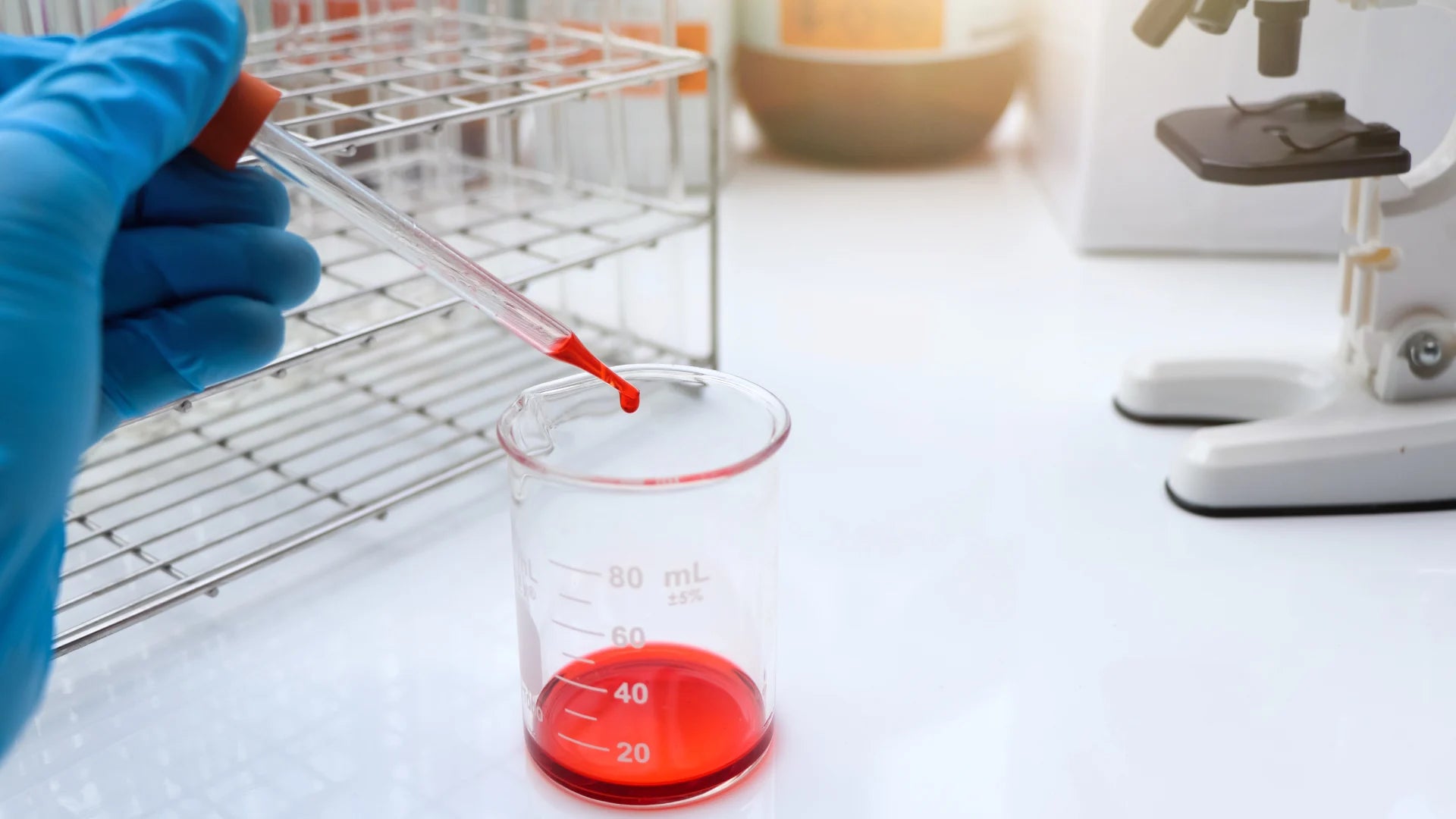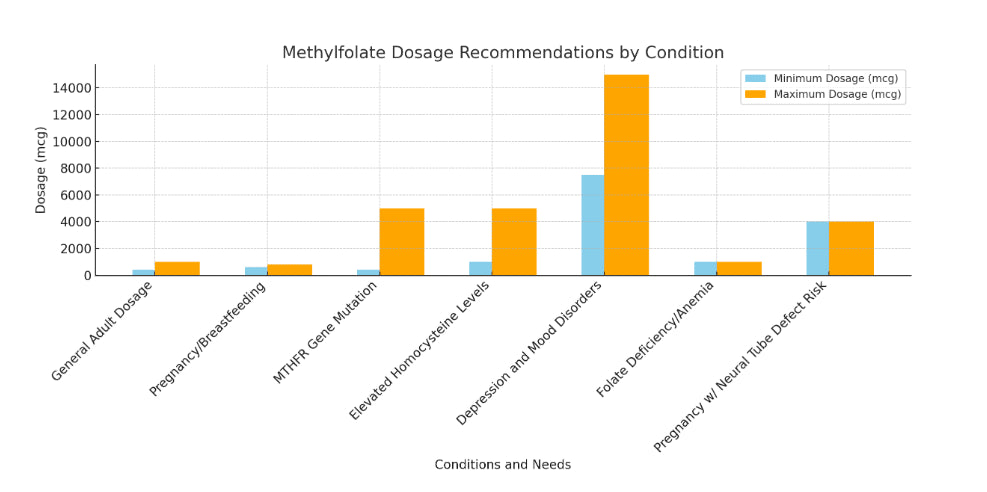
Methylfolate is the active form of folate (vitamin B9) that the body can use directly. Folate, or synthetic folic acid, is vital for cell growth, DNA synthesis, and red blood cell production. However, not everyone can convert folic acid into methylfolate. Methylfolate is important because it is already in usable form, eliminating the need for conversion in the liver. [1]
Folic acid is the synthetic form of vitamin B9 found in supplements and fortified foods. The body must convert it into the active form, 5-MTHF, using the enzyme MTHFR. Some people have genetic variations that reduce their ability to make this conversion efficiently.
In individuals with MTHFR mutations, taking methylfolate directly bypasses the need for this conversion, making it a more effective form of vitamin B9. Methylfolate is found naturally in foods that are high in folate, such as Leafy green vegetables (spinach, kale, and broccoli), Legumes (beans, lentils, and chickpeas), Citrus fruits (oranges, grapefruits), Avocados, and Beets. [2]
Methylfolate is present in Miduty Happy Heart, Thick and Grow, Multivitamin, Berberine HCL 98% , Organic Blood Builder, and Vitamin B12 Supplement.
1. Most Active Form of Vitamin B9: Methyl folate is the bioactive form of vitamin B9, ready for immediate use by the body. Unlike folic acid, it doesn’t require additional conversion, ensuring more efficient absorption and utilization.
2. Bypass Genetic Mutations: Individuals with MTHFR gene mutations often cannot efficiently convert folic acid into its active form. Methyl folate eliminates this issue by providing the active version directly, ensuring everyone can benefit from it.
3. Highly Bioavailable: Methyl folate offers superior bioavailability, meaning it is easily absorbed and used by the body at the cellular level. This makes it a more effective and reliable option for supporting health.
| Uses & Benefits | Description |
| Treatment of Folate Deficiency | Folate deficiency occurs when the body lacks enough vitamin B9, leading to fatigue, anemia, and cognitive issues. Folate helps produce red blood cells that carry oxygen throughout the body. Methylfolate supports red blood cell production, boosting energy. It also aids in DNA replication and repair, essential for healthy cell division and growth, especially in cells like those in the skin, gut, and bone marrow. [3] |
| Support for Mental Health | Methylfolate helps produce neurotransmitters like serotonin, dopamine, and norepinephrine, which regulate mood and emotions. [4] It can improve antidepressant effectiveness and ease depressive symptoms. A folate deficiency can disrupt serotonin production, leading to anxiety, but methylfolate restores balance for better mood and stress management. People with MTHFR gene mutations may have trouble converting folic acid, but methylfolate bypasses this issue and provides direct benefits. [5] |
| Pregnancy and Prenatal Health | Folate deficiency in the first trimester can lead to neural tube defects like spina bifida and anencephaly. [6] Methylfolate helps ensure proper neural tube closure, reducing these risks. It also supports placenta development, providing the fetus with essential nutrients and oxygen, which can prevent complications like preeclampsia. Methylfolate is particularly beneficial for women with MTHFR mutations, as it is directly absorbed without conversion. |
| Cardiovascular Support | Methylfolate helps convert homocysteine to methionine, protecting heart health. [7] High homocysteine levels can damage blood vessels and increase the risk of atherosclerosis and blood clots, leading to strokes or heart attacks. Methylfolate regulates homocysteine levels, reducing these risks and supporting healthy arteries. It’s especially important for individuals with a family history of heart disease. |
| Neurological Health and Cognitive Function | Low folate levels can lead to memory loss and reduced mental clarity. Methylfolate supports brain cell function and boosts neurotransmitter production, improving memory, focus, and cognitive performance. [8] It helps reduce oxidative stress in the brain, lowering the risk of conditions like Alzheimer’s and dementia. |
| Support for Autoimmune and Chronic Conditions | Fibromyalgia and Chronic Fatigue Syndrome (CFS) are linked to low cellular energy. [9] Methylfolate boosts energy production, reducing fatigue and muscle pain. It also supports immune function by helping repair cells damaged by autoimmune attacks, aiding in conditions like lupus and rheumatoid arthritis. |
| Aid in Detoxification | The liver relies on methylation for detoxification processes. [10] Methylfolate, as a methyl donor, is integral to this pathway. Methylfolate enhances the liver’s ability to eliminate harmful toxins, heavy metals, and chemicals from the body. It combats oxidative stress by supporting the production of glutathione, a powerful antioxidant. This not only protects liver cells but also promotes overall systemic health. |
| Skin, Hair, and Nail Health | Folate aids in collagen production and cell regeneration, helping heal wounds, reduce acne scars, and maintain skin elasticity. By improving nutrient absorption and circulation to hair follicles, methylfolate encourages stronger and healthier hair growth. Methylfolate supports keratin production, preventing brittle and weak nails. |
The adequate dosage of methylfolate can vary depending on age, health status, and specific needs.

1. General Adult Dosage: 400 mcg to 1,000 mcg (1 mg) per day is commonly used for general health and to meet daily requirements of folate.
2. Pregnancy and Breastfeeding: 600 mcg to 800 mcg per day to support fetal development and prevent neural tube defects. 500 mcg per day to meet increased nutritional needs.
3. MTHFR Gene Mutation: Many individuals with this mutation are advised to take between 400 mcg to 5 mg daily, depending on the severity of their condition and their ability to metabolize folate.
4. Elevated Homocysteine Levels: Dosages of 1 mg to 5 mg daily are often recommended to help regulate homocysteine and support cardiovascular health.
5. Depression and Mood Disorders: Clinical trials have used dosages of 7.5 mg to 15 mg per day. Consult a healthcare provider for guidance.
6. Folate Deficiency or Anemia: A typical dose for folate deficiency treatment is 1 mg daily or as directed by a healthcare provider.
7. Pregnancy with Known Neural Tube Defect Risk: Women with a history of neural tube defect pregnancies may be advised to take 4 mg (4,000 mcg) daily before conception and during early pregnancy.
1. Morning or Early Afternoon: Methylfolate can boost energy and alertness as it helps in the production of neurotransmitters. Taking it in the morning prevents potential interference with sleep.
2. With or Without Food: Methylfolate can be taken with or without meals, but taking it with food might reduce the risk of stomach upset, especially for those with sensitive digestive systems.
3. With Vitamin B12: If you are also taking vitamin B12, take them together. These two vitamins work synergistically to support red blood cell formation and neurological health.
4. Pregnancy or Trying to Conceive: Consistent daily intake is crucial, as methylfolate is essential for fetal development.
1. Allergic Reactions: Some people may be allergic to dandelion, leading to symptoms like skin rash or respiratory issues.
2. Gastrointestinal Issues: High doses of dandelion may cause digestive discomfort, including upset stomach, diarrhea, nausea or heartburn.
3. Interactions with Medications: Dandelion can interact with certain medications, especially diuretics and blood thinners. It’s advisable to consult a healthcare provider before starting any new herbal supplement.
4. Increased Urination (Diuretic Effect): Dandelion is known for its diuretic properties, which increase urine production. While this can be beneficial for reducing water retention, it may cause excessive urination in some people. Dehydration, electrolyte imbalance, or low potassium levels, particularly with excessive or long-term use.
Methylfolate is a vital, bioactive form of folate that supports various health functions, including hair growth, mental health, cardiovascular health, and detoxification. It’s particularly beneficial for those with MTHFR mutations, ensuring better absorption and effectiveness.
Miduty’s Methylfolate in supplements like Happy Heart and Thick & Grow provides the active form of folate, ensuring optimal benefits for your body without the need for conversion. Whether you're aiming for improved cognitive function, stronger hair, or overall health, Methylfolate can make a difference in supporting your body’s natural processes.
| Sr. No. | Reference |
|---|---|
| 1. | Active Folate Versus Folic Acid: The Role of 5-MTHF (Methylfolate) in Human Health - PMC |
| 2. | |
| 3. | |
| 4. | |
| 5. | Folate Insufficiency Due to MTHFR Deficiency Is Bypassed by 5-Methyltetrahydrofolate - PMC |
| 6. | |
| 7. | |
| 8. | |
| 9. | |
| 10. |
